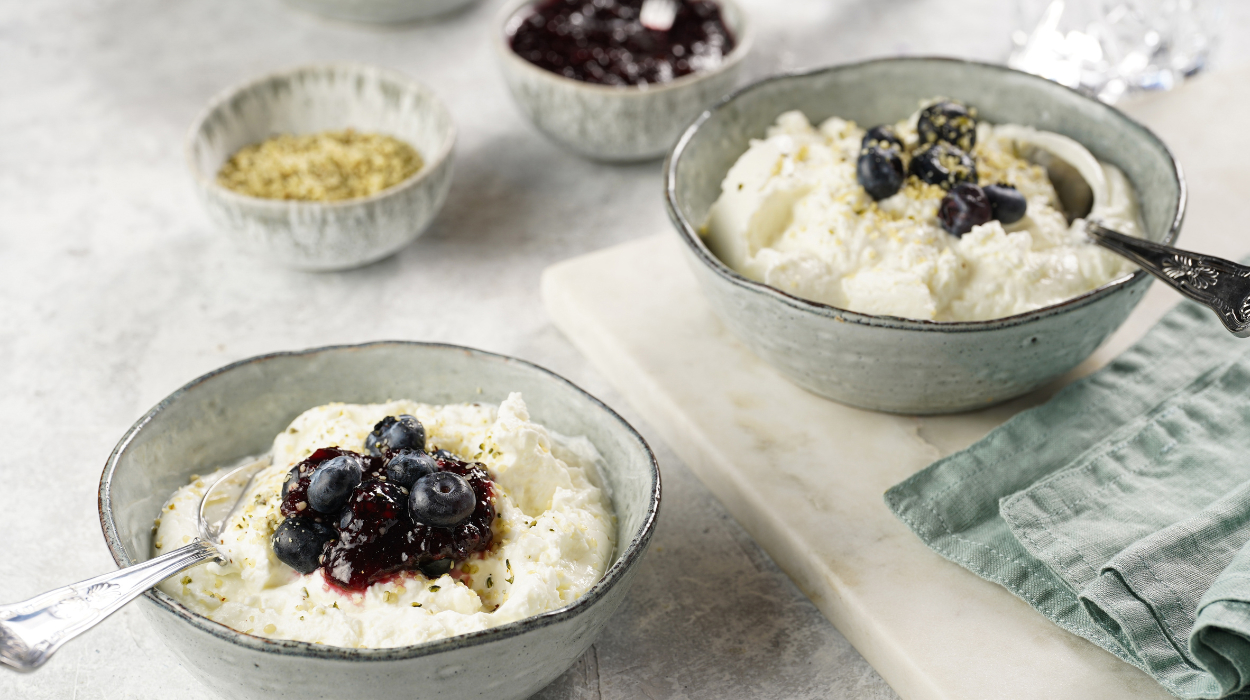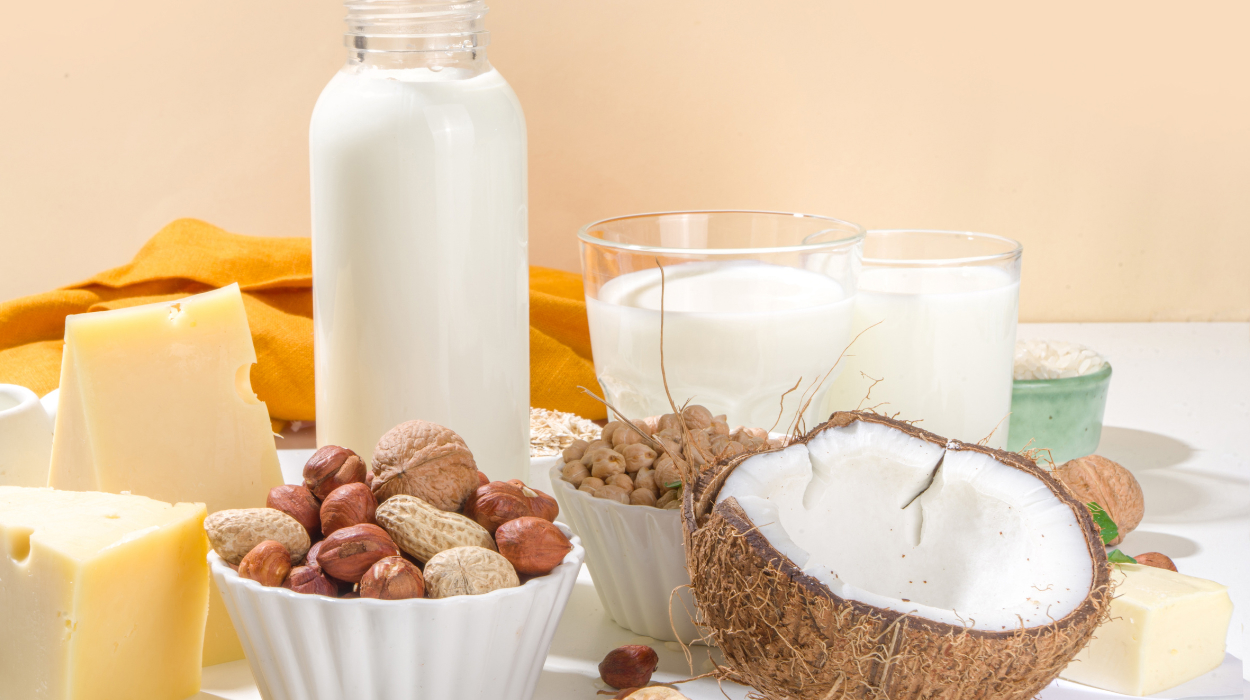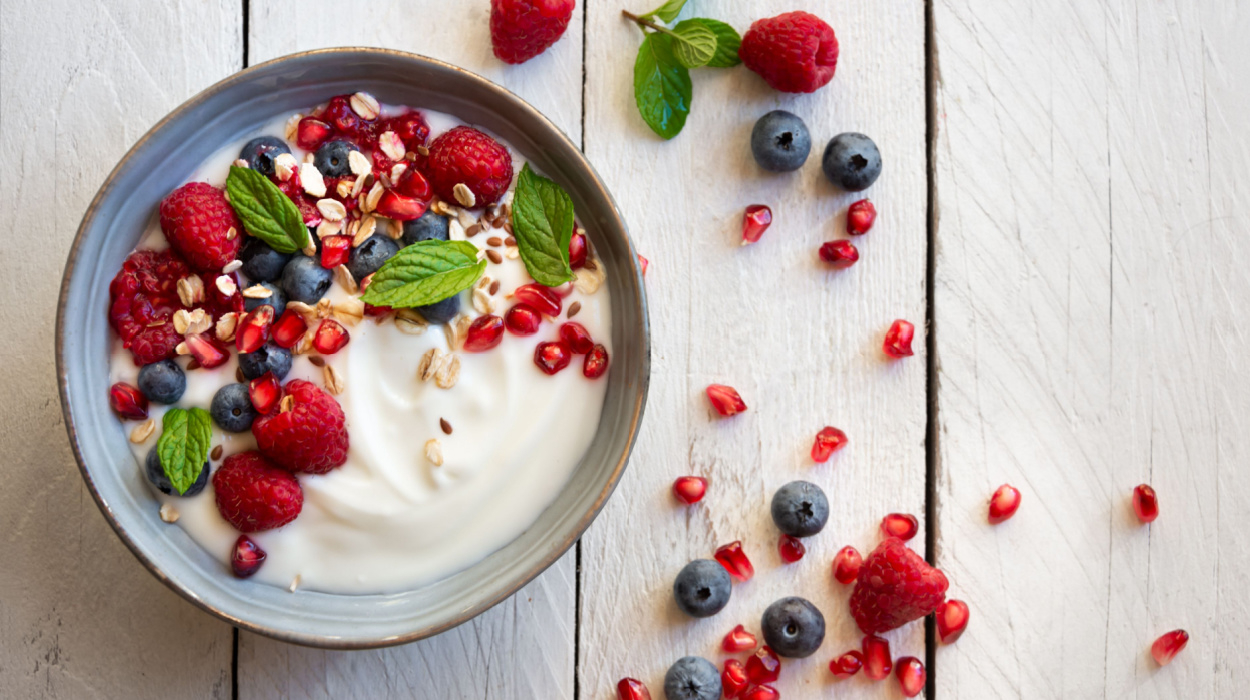Finding good foods for weight loss can be challenging, given the abundance of options.
Yogurt is commonly embraced in weight loss diets, but understanding which yogurt is the best for weight loss is crucial for success.
Fortunately, there are several varieties available that strike just the right balance between taste and weight-loss benefits. It’s important you understand their nutritional profiles and health benefits to determine what’s right for you.
In this article, we’ll determine the best yogurt for weight loss, dissecting various yogurt types and considering their benefits for weight loss.
Let’s get started!
Best Yogurt To Eat For Weight Loss
- The best yogurt for weight loss depends on your preferences and goals.
- Greek and Icelandic yogurt offer protein-rich, low-sugar options.
- Kefir is a great option if you’re looking for the best yogurt for gut health and weight loss.
- With its healthy fats, whole-milk yogurt offers a good option for those who want to feel fuller for longer.
- If you’re looking for lactose-free or non-dairy options, plenty of plant-based alternatives are readily available.
- Choose plain, unsweetened varieties to avoid added sugars and calories.
- As always, achieving sustainable weight loss is all about a balanced and healthy diet.
Best Yogurt For Weight Loss
Starting your weight loss journey will involve making mindful food choices, and yogurt stands out as a versatile and nutrient-rich option.
The vast array of yogurt options in the dairy aisle can be overwhelming, each claiming its own set of health benefits. In this section, we’ll shed some light on which yogurt is the best for weight loss and why.
Greek Yogurt
Compared to regular yogurt,[1] Greek yogurt[2] contains about double the amount of protein. One serving of Greek yogurt contains about 18 grams of protein, compared to 7 grams of protein found in regular yogurt. This is particularly great for weight loss, as it can help you feel fuller for longer,[3] helping to curb cravings between meals.
Greek yogurt is also low in sugar and has a low glycemic index. The glycemic index is a scale that measures how quickly carbohydrates raise blood sugar levels. Foods with a low glycemic index release sugar into the bloodstream slower and steadier.
This major benefit, if you’re trying to lose weight, is a stable blood sugar level.[4] This promotes better energy levels throughout the day, reducing feelings of hunger[5] and curbing cravings.
When choosing the best Greek yogurts for weight loss, opt for plain Greek yogurt labeled as “low-fat” or “non-fat.” Additionally, choosing plain, unsweetened Greek yogurt avoids the added sugar found in flavored options. Try to avoid full-fat or yogurts that contain artificial sweeteners, as they can contribute to excess calories and sugar cravings.
Try using plain Greek yogurt to enhance breakfast options like smoothie bowls and parfaits or to provide a creamy element to savory dishes like soups or sauces.
Icelandic Yogurt
Icelandic yogurt, also known as Skyr, is similar to Greek yogurt in terms of its nutritional profile.
One of the standout features of Icelandic yogurt is its high protein content. A typical serving contains 20 grams of protein,[6] packing quite the protein punch. This creates a feeling of fullness and supports muscle growth and repair,[7] which is essential if you’re exercising regularly.
Icelandic yogurt typically contains much lower amounts of naturally occurring sugar compared to flavored varieties.[8] This is particularly beneficial if you’re trying to reduce your carbohydrate intake.
The live cultures in Icelandic yogurt contribute to a balanced and thriving gut microbiome.[9] They do this by maintaining a diverse and robust community of microorganisms in the gut, which can support digestion.[10]
Some research suggests that a healthy gut microbiome may contribute to weight loss efforts.[11] Also, the live cultures in Icelandic yogurt may support immune health,[12] potentially reducing the risk of infections and supporting general health.
Try to find the plain, unsweetened versions of Icelandic yogurt to avoid the added sugars commonly found in flavored varieties.
Kefir Yogurt

Kefir is a fermented milk drink that’s similar to yogurt but has a thinner consistency.
It’s loaded with probiotics,[13] surpassing that of many other traditional yogurt varieties. Kefir yogurt also contains a wider spectrum of probiotic strains, promoting an even more diverse gut microbiome. This makes Kefir a great option for those looking for the best yogurt for both gut health and weight loss.
Kefir yogurt is an excellent protein source,[14] a crucial component of any weight loss diet. Kefir yogurt is low in sugar and calories, making it a great option for weight loss. It’s also a good choice if you’re lactose intolerant, as its probiotic content helps break down lactose.[15]
When choosing a Kefir yogurt, try to find lower-fat and plain options to manage your calorie and fat intake.
Whole-Milk Yogurt
Whole-milk yogurt, while being traditionally higher in fat[1] than other yogurt varieties, offers unique nutritional benefits. The richness of the whole milk gives the yogurt a creamy texture, which offers a more indulgent experience.
Whole milk yogurt has a higher fat content, which can contribute to a prolonged feeling of fullness. Also, the fat in the yogurt will help the absorption of fat-soluble vitamins[16] such as vitamin D.
Whole milk yogurt is also a great source of conjugated linoleic acid[17] or CLA, a type of fatty acid that has been linked to weight management.[18] Some studies suggest that CLA may support fat loss whilst also preserving lean muscle mass.
While whole-milk yogurt may have a higher calorie content, its unique nutritional profile and its ability to boost satiety make it a worthwhile contender for weight-loss diets.
Plant-Based Yogurt

Plant-based yogurts, derived from almond, soy, or coconut sources, offer benefits if you’re seeking weight loss and a dairy-free alternative. These yogurts[19] are often lower in calories, saturated fats and lack cholesterol.
One popular plant-based yogurt is almond yogurt. Almond yogurt[20] tends to be lower in calories compared to dairy yogurts. Almonds are a good source of monounsaturated fats, which are known for supporting heart health.[21] These fats also help you feel fuller for longer,[22] helping curb hunger and potentially reduce calorie consumption.
Soy yogurt is another popular alternative for weight loss, largely because it is a great source of plant-based protein.[23] A typical serving of soy yogurt contains around 6 grams of protein, which is similar to the amount you would find in plain yogurt. Soy yogurt is also very low in saturated fats, which is great for people at a higher risk of cardiovascular disease.
Coconut yogurt offers several benefits for those looking to shed some pounds. Like other plant-based yogurts, it tends to be lower in calories[24] than dairy yogurts. It also contains medium-chain triglycerides,[25] which have been linked to weight loss,[26] slimmer waistlines, and reduced inflammation.
When choosing plant-based yogurts for weight loss, choose those labeled as “unsweetened” to avoid added sugars.
How Yogurt Can Help You Lose Weight
Eating yogurt can be a smart and delicious way to support your weight loss journey. Here are several ways yogurt can help you lose weight.
Rich In Protein
Yogurt, particularly high-protein yogurts like Greek yogurt, can be valuable sources of protein. Protein is crucial for promoting satiety and helping control overall calorie intake. Protein also supports muscle maintenance, which is essential during weight loss to preserve lean muscle mass.
Satisfying And Filling
The protein and fat in yogurt provide a satisfying and filling snack. Feeling fuller for longer can reduce the temptation to indulge in unhealthy snacks between meals. Just remember that in certain varieties, like low-fat Greek yogurt, this effect will be lessened due to the reduced fat content.
Calcium Content
Yogurt is an excellent source of calcium, a mineral that plays a role in fat metabolism.[27] An increased calcium intake has been associated with reduced body mass.
Probiotics For Gut Health
Many yogurts contain live and active cultures that support a healthy gut microbiome. A balanced gut environment is linked to improved digestion, reduced inflammation, and potentially weight loss.
Versatility
Yogurt is incredibly versatile and can be incorporated into various meals and snacks. It’s also incredibly accessible, with drinkable yogurts now widely available. Yogurts also commonly come pre-portioned, making it even easier for you to control your calorie intake.
While yogurt offers several weight loss benefits, it’s crucial that you choose the healthiest yogurt available to support your weight loss efforts. Opt for plain, unsweetened yogurt to avoid added sugars. Flavored yogurts, particularly fruit-flavored yogurts, are often laden with extra calories.
Best Time To Eat Yogurt For Weight Loss
Timing your yogurt consumption can play a role in optimizing its benefits for weight loss. Here are some options for incorporating yogurt into your daily diet.
Breakfast
Consuming yogurt in the morning as part of a balanced breakfast can be an excellent choice. The protein in the yogurt will help you feel fuller for longer, preventing you from mid-morning snacking.
Snack Between Meals
Yogurt can be a convenient and portable snack, especially between meals where necessary. Its combination of protein and carbohydrates will help keep your energy levels up, preventing excessive hunger that could lead to snacking.
Post-Workout
After exercising, yogurt can be a beneficial, healthy snack. The protein will help your muscles recover, and the carbohydrates will support glycogen replenishment. Consider adding fruits or a drizzle of honey to enhance its nutrient content and flavor.
Evening Snack
Enjoying yogurt as an evening snack can be a healthy way to curb late-night cravings. Opt for a smaller portion of yogurt to avoid excessive calorie intake close to bedtime.
Dessert Alternative
Eating yogurt as an alternative dessert or sweet treat is a healthier alternative to calorie-dense options. Yogurt with a drizzle of honey and fresh berries can satisfy sweet cravings without compromising your weight loss goals.
While there isn’t a one-size-fits-all answer to the best time to eat yogurt, the key is to work out a way that aligns with your preferences and lifestyle.
Conclusion
The best yogurt for weight loss depends on your preference and dietary needs. Opting for plain, unsweetened varieties ensures lower sugar intakes and overall calories.
It’s important to keep in mind that sustainable weight loss hinges on a combination of exercise, a healthy diet, and proper hydration. If you’re looking for further help with your weight loss journey, plenty of supplements on the market can support you.
So, if you’re looking for a healthy and delicious food option to help you lose weight, give yogurt a try!
Frequently Asked Questions
Yes, incorporating yogurt into your daily diet can support weight loss. Remember to choose low-fat and unsweetened varieties to optimize its benefits for weight loss fully.
While yogurt alone doesn’t burn belly fat, its protein content can support weight loss by promoting fullness. Coupled with a balanced diet and exercise, yogurt can contribute to overall calorie control and healthier body composition.
Yes, eating yogurt can be beneficial for your weight loss journey. Choose low-fat and plain varieties to avoid added sugars and additional calories that could negatively affect your efforts.
Yogurt alone won’t burn fat, but its protein content may help control appetite, which in turn could lead to fat loss. Enjoying a small portion before bed as part of a balanced diet can provide a satisfying and nutritious snack.
 Evidence Based
Evidence Based